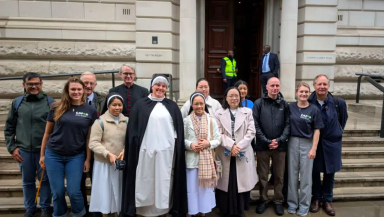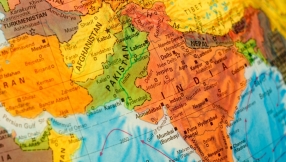
A global wave of candlelit vigils and public demonstrations unfolded across more than 30 countries this week, as campaigners urged world leaders to take action on the mounting debt crisis affecting low-income nations.
The initiative, titled the Relay of Hope, brought together faith leaders, civil society organisations, and communities from six continents in a symbolic call for economic justice.
On Tuesday, representatives from different faiths assembled in front of the UK Treasury building in London, joining international participants in a five-day campaign to highlight how burdensome debt payments are depriving millions of access to basic services such as healthcare and education.
According to the Catholic Agency for Overseas Development (CAFOD), which organised the London event, over 3.3 billion people are affected by national budgets that prioritise debt servicing over essential sectors such as health or education.
CAFOD’s Campaigns and Outreach Manager, Helen Moseley, warned of the human cost of the current debt structure: “Lack of regulation means predatory lenders are making billions in profits, at the expense of vulnerable countries, where millions lack access to basic essentials like education and healthcare. Around 90% of low-income countries’ private debt is held in the City of London under English law.
“The UK must act to compel these private lenders to lend more responsibly. To provide a long -term solution we need an independent mechanism that brings together all parties to ensure that there are no future debt crises.”
The Director of Faith for the Climate echoed those concerns, highlighting the climate implications: “Countries like Kenya are in an unsustainable position, having to borrow more to pay the interest on their existing debts. These payments are being made to big banks and lending institutions at the expense of hiring doctors and teachers, building schools, hospitals, and sewage systems, preparing for floods, or coping with droughts and other impacts of climate change.
“We are calling on world leaders to fix a broken financial system that is crippling dozens of countries.”
The campaign called for urgent reforms including debt cancellation and fairer international finance rules.
The initiative coincides with the Catholic Church’s Jubilee Year, a tradition historically linked to debt forgiveness.
The campaign draws inspiration from the late Pope Francis’s 2015 encyclical 'Laudato Si’, in which he called for a financial system that protects the planet and prioritises the poor.
He inaugurated the Jubilee year with a formal appeal of debt forgiveness in countries facing severe repayment challenges.
His successor, Pope Leo XIV, has continued to advocate for the cancellation of unpayable debts, exhorting religious communities to reject an economy “that impoverishes peoples and the Earth.”
Over the five-day period from 24 to 28 May, events were staged in iconic locations including the UN headquarters in New York, the US Capitol, and St Peter’s Square in Rome.
Across the globe, from South America to Southeast Asia and the Pacific to Africa, communities engaged in local “relay stages,” organised by Caritas Internationalis, a Catholic aid federation, as a contribution to the #TurnDebtIntoHope campaign, passing the light of a symbolic candle from country to country in solidarity.
Campaigners hope the effort will pressure global leaders ahead of a major UN summit on development finance in Seville next month.
Dominican nun, Sister Karen Marguerite d’Artois, remarked: “We are joining with communities around the world in this symbolic act, to stand in solidarity with those suffering in debt-distressed nations and demand a global financial system that protects lower income countries, enabling them to spend money on development, education and health as opposed to servicing unfair debt payments.”
As the campaign concludes, organisers are urging the public to sign a petition and contact their elected officials in support of debt cancellation and financial reform.













